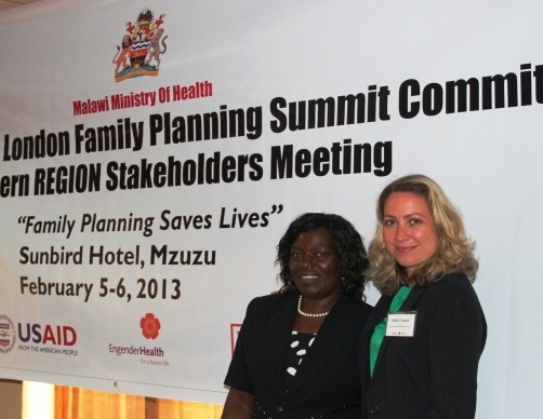Over the past decade, Malawi’s family planning (FP) program has made remarkable strides in expanding access to FP to help women and couples better meet their desired family size. As a direct result of advocacy efforts and renewed government commitment to FP, a broader mix of contraceptive options are becoming more widely and equitably available, including long-acting and permanent methods (LA/PMs) such as implants and female sterilization. However, despite impressive gains [1], high unmet need and barriers to FP information and services persist. To learn more, EngenderHealth’s Holly Connor sat down with Dorothy Nyasulu, Assistant Representative for UNFPA/Malawi and a leading champion on human rights and gender equality for over 20 years, to discuss the intersection of FP, contraceptive choice, and human rights in her home country.
[1] The modern contraceptive prevalence rate (CPR) increased from 22.4 in 2004 to 32.6 by 2010 (Malawi Demographic and Health Surveys)
As stated in the 1994 ICPD Programme of Action, access to a wide range of contraceptive options is a human right, yet is just a dream for many Malawians. While the ICPD’s principles are written into the national population policy, 60% of FP users rely on the short-acting injectable, indicating possible limitations to choice for women who may have other preferences. With a high unmet need in Malawi for FP for both spacing pregnancies (12%) and stopping childbearing altogether (14%) [1], women need accurate information about and access to a range of methods, including LA/PMs, in order to make informed decisions based on their reproductive intentions. For the country to achieve its FP2020 commitment to increase the CPR from 33% to 60% by 2020, respecting, protecting, and fulfilling rights must be central to all programmatic efforts.
[1] NSO & ICF Macro, 2011
What are the key challenges to the realization of rights and choice in Malawi?
There are several barriers to accessing FP in Malawi that impede the realization of rights and choice. With over 80% of the population living in rural areas [1], distance can be an obstacle to accessing services. Provider shortages and frequent commodity stock-outs compound this problem. A lack of adequate information about FP is another challenge to ensuring that Malawians have the FP knowledge to make informed decisions, and know where to access services. Many FP users are often not aware of other method options better suited to meeting their needs, like implants and the IUD. Lacking access to complete and accurate information, many women rely on misinformation from friends.
Poor quality of care also places limitations on choice. Providers must be knowledgeable, unbiased, and committed to offering quality services that empower clients; there have been situations when a client wanting to limit her family size is discouraged by a provider from using FP, or the provider pressures her into using a certain method. Empowering community-level health workers with FP knowledge would engender more informed clients.
Socio-cultural barriers include unsupportive family and/or partners, gender inequality, low literacy rates [2], opposition from religious leaders, and early marriage. Further, stigma against sexually active, unmarried youth persists and many parents and traditional leaders are not convinced that sexually active young people should use FP. With 46% of the population under age 15 (with over 20% of girls giving birth by age 17) [3], improving access to youth-friendly services focused on meeting this cohort’s unique FP needs is vital to ensuring that all client’s rights are respected.
How do you suggest Malawi’s FP program continue to work towards promoting and protecting reproductive rights and contraceptive choice?
While rights holders (especially women and girls) need to take a lead in holding FP programs accountable, programs must also work to promote and protect reproductive rights, including contraceptive choice. Programs must also be responsible for developing and upholding the autonomy of FP users and for ensuring service quality and access to accurate information. Malawi’s RH/FP-related laws and policies must clearly protect the rights of users. Strengthening the country’s health system will ensure a wider availability of methods, improved accountability mechanisms, quality counseling and monitoring, the institution of clear protocols, and will ultimately lead to greater service capacity . Moreover, in order to make choice and rights a reality in Malawi, all stakeholders (donors, government, NGOs, and program managers) need to work together to move beyond FP targets.
Have you taken any action as a consequence of the Bellagio Consultation?
Following the Bellagio consultation, I met with the Ministry of Health/Directorate of Reproductive health (MOH/DRH) to discuss the importance of contraceptive choice in Malawi and shared my suggestions on how we might use the National Sexual Health and Reproductive Rights policy as an entry point to advance choice in the country. Discussions from the Consultation informed my recent presentation to UNFPA’s implementing partners, where I highlighted the promotion of expanding the country’s method mix as a key area for consideration when developing next year’s workplan.
For more on Malawi’s FP program successes, click here.



